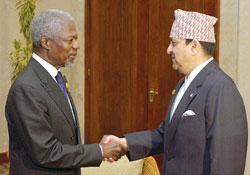|
|
Kofi Annan passed, with 2006, into the realm of 'former' and 'ex' UN secretary-general two weeks ago. We now have Ban Ki-Moon, a Korean, ruling from the 38th floor of the UN headquarters in New York. As is customary, many articles have appeared here and abroad detailing Annan's 10-year-long stint as the top UN official.
Almost all have praised him for his robust leadership of the UN, though there has also been occasional criticism, as for the oil-for-food scandal and sexual abuse by UN peacekeepers. In Nepal, the coverage of Annan's tenure has focussed almost entirely on how his personal interest got the world body involved in resolving the conflict.
All true but, as he departs the world stage, Annan's career graph, particularly in the later years, has lessons for Nepal's peace process.
Annan was the UN under-secretary general for peacekeeping when the Rwanda genocide exploded in 1994. The record shows that if he, and the UN, had acted with sanity then, rather than with their deadly bureaucratic mindset, the genocide could have been averted.
In 1994, General Romeo Dallaire, a Canadian general in command of the UN's puny peacekeeping force in Kigali, was informed by a government source that Hutu extremists, backed by the Hutu government, intended to murder thousands of Tutsis in the coming months. This was an intelligence scoop of the first magnitude. The source offered to tell the UN where the arms caches were hidden. All he wanted in exchange was safe passage for himself and his family.
The general (who later went crazy because of his inability to stem the genocide), immediately faxed the information to the UN's Department of Peacekeeping Operations, headed at the time by Annan. He urged safe passage for the source and appealed for authorisation to take out the arms caches. What did Annan's department say in return?
"Cool off.You have no business, General, interfering in the internal affairs of a member state. We advise you to relay whatever information you have to the Rwandan government." Then UN secretary-general Boutros Boutros Ghali could have overruled his subordinate, but he signed off on the cable prepared by Mr Annan's department.
What happened next needn't be recounted in detail. With the UN taking a hands-off approach, extremist Hutus did exactly what the source had warned they would. From 6 April to mid-July 1994, Rwanda was hell, as hordes of Hutu extremists, egged on by the government, slaughtered 800,000 unarmed Tutsi and moderate Hutu civilians. The arms cache sure came in handy, as did the 'community' FM stations that spread communal hatred in realtime.
General Dallaire was reduced to defending his UN compound, in which he managed to give refuge to 20,000 Tutsis. Unable to reconcile himself to what had happed in Rwanda under his watch, he took to drinking heavily. He was later found a broken man, drunk and sprawled on a park bench in Quebec.
This dark episode in mankind's history did not stop Annan's progress. Two years later, all was forgotten and he was chosen to lead the UN as its new secretary-general. The man certainly learned on the job though. In the later years of his tenure, he pushed hard to avert crises in Darfur and Iraq, but without much success. Annan deserves praise for bringing early UN attention to Nepal, but in his heart, the souls of those Rwandan dead probably haunt him.
This story is told not as a critique of Annan or the UN, but as a reminder to everyone that the UN is not the mother-of-all-solutions. Its intentions are almost always noble, but it is not what we want it to be, when we want it to be. It cannot perform miracles when miracles are not wanted.
There is a lesson in this for us: How Nepal manages the future will ultimately depend on how we Nepalis behave, not on what the UN does.




